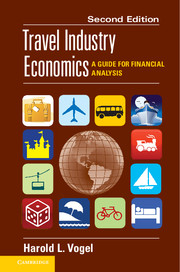Book contents
- Frontmatter
- Contents
- Preface
- Part I Introduction
- Chapter 1 Economic Perspectives
- Part II Getting There
- Part III Being There
- Part IV Doing Things There
- Part V Roundup
- Appendix A Sources of Information
- Appendix B Valuation Concepts
- Appendix C Major Games of Chance and Slots
- Glossary
- References
- Index
- References
Chapter 1 - Economic Perspectives
from Part I - Introduction
- Frontmatter
- Contents
- Preface
- Part I Introduction
- Chapter 1 Economic Perspectives
- Part II Getting There
- Part III Being There
- Part IV Doing Things There
- Part V Roundup
- Appendix A Sources of Information
- Appendix B Valuation Concepts
- Appendix C Major Games of Chance and Slots
- Glossary
- References
- Index
- References
Summary
Travel broadens the mind.
– Proverb, early twentieth centuryIt also costs money and takes up time.
This chapter examines the fundamental economic factors that affect all aspects of the travel and tourism business. The perspectives provided by this approach will provide a framework for understanding how travel industries are defined and fit into the larger economic picture and will also highlight the financial features that guide investments in this field.
Time concepts
Alternatives
You need time to get from here to there. And given that time-transport machines are still to be seen only in science fiction films, it is worth spending a little time to understand the economic value of time.
Time for leisure or business travel comes out of a budget that includes time for work, time for play, and time for taking care of the necessities of life. In recent years, though, the boundaries between these categories have become increasingly blurred. For instance, what is loosely known as “leisure time” is widely considered as being time in which people are free from having any sense of obligation or compulsion to do anything. Yet the term leisure might as easily be characterized as time not spent at work. No matter what the definitional preference, however, the essential economic fact is that time has a cost in terms of alternative opportunities foregone.
- Type
- Chapter
- Information
- Travel Industry EconomicsA Guide for Financial Analysis, pp. 3 - 42Publisher: Cambridge University PressPrint publication year: 2012



